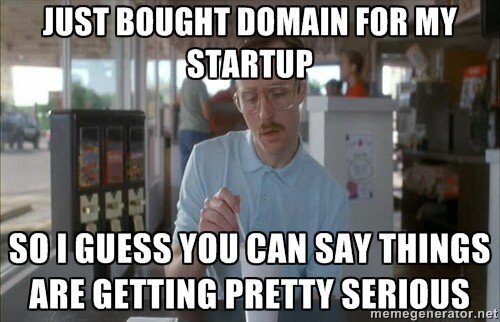It’s easy to think that you’re making progress in your business when you’re doing stuff that feels like work. It feels like progress to sit at a keyboard (or literally anywhere with your phone), head to a to your favorite domain registrar, and spend anywhere from a few bucks to a few thousand securing the perfect domain for your business. Or in some cases, mine included, a bunch of domains.
Is that real progress though? Did buying those domains directly contribute to supporting the next person that needs your product, service, or expertise? If an entrepreneur buys a domain but no one ever finds it or buys anything, is it really a business?
Probably not - to all three questions.
That’s not a bad thing though. Buying domains, building websites, and doing all the things that help people find you is definitely necessary when you’re building a business and a brand that you intend on standing behind for the long haul. Necessary and (not but) is only a small part of what goes into building a business.
I picked this meme today because I see and hear stuff like this all the time. I’ve witnessed tons of would-be entrepreneurs buy domains and pour time, money and resources into building a platform that they ultimately do nothing with. So, I wanted to bring some awareness and challenge you if you’re someone like this to do a bit of real reflecting.
Why?
Because the feel-good chemicals that your brain releases when you feel like you’re being productive are easy to come by when you’re doing things like buying domains, setting up social profiles and even writing a blog post. Ego is definitely not a friend to the entrepreneur. Especially once all that stuff is done and you’re knocking on the door of the deeper work that is required to get you to the next phase of building a business starts all those good feels instantly start to evaporate. They evaporate because the work required to get found, make a sale and deliver on a promise means that they’re dependent on someone else. A customer has to trust you enough to say yes to you and believe that you can do what you said you can do for the next dose of validation. Then you have to deliver on your promise and again wait for the feedback.
It’s a pretty volatile process.
I tell my economics students that people are utility-maximizing machines. Your brain is designed to help you make choices about how you expend your cognitive resources in service of providing you with experiences that maximize how good you feel (or at least minimize the bad). Business ideas die after you buy a few domains and build a site because your brain instantly weighs the opportunity cost of the continued commitment to growing and the risks that come with putting yourself out there and being rejected against the possible gains that come with success. It’s tough to reasonably predict those gains for brains especially if you’ve never experienced the kind of success you’re looking for.
For some though it’s an easy choice, their passion and belief create enough of a benefit to outweigh the perceived costs. For them, it’s not that they don’t think the same things or have different brains it’s that they approach the formulas giving variables slightly different weights. They have the capacity to sit with all the social, financial, emotional, and any other risk you can think of a little longer. For the businesses that seem to never progress past the domain buying phase, it’s the opposite - the juice wasn’t worth the squeeze right out of the gate.
At this point, this post is probably reading like I’m romanticizing the risk-takers and am dooming those that are more risk-averse when it comes to building a business. That’s definitely not my intention. What I want to do is challenge you to think about why you bought those domains, what were your intentions when you started, and ask how committed you are to the long process that comes with being an overnight success.
If you bought the domains then there was a spark of entrepreneurial life in that idea. It might be worth some additional vetting (here’s a link to post I wrote all about how to vet your idea) and just a little more work to figure out if you were just chasing the rush that comes with telling people you're an entrepreneur or if you actually have a real business on your hands.
Lastly, and borrowing from Marie Forleo, “Everything is figureoutable!”.






